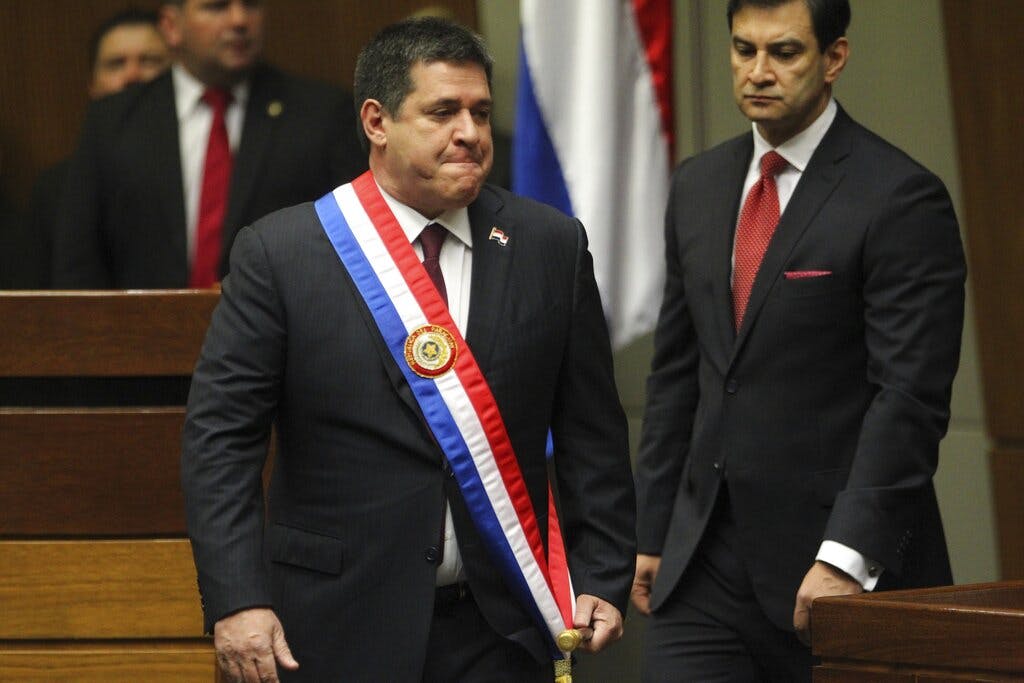Biden’s Sanctions in Paraguay Could Aid Communist Chinese Efforts To Build Influence in South America
With a presidential election looming, Treasury-imposed sanctions are putting at risk the country’s long-lasting relationship with the Republic of China on Taiwan.

By undermining Paraguay’s ruling party, Washington is contributing to a likely election loss for Latin America’s last non-leftist government — and to the deepening of Communist China’s presence in the hemisphere.
Months before the April 30 presidential election, the Biden administration imposed sanctions on members of Paraguay’s ruling Colorado Party. At stake is the country’s long-standing relationship with the Republic of China on Taiwan. That bond will be broken if the left-wing party takes office, in order to establish relations with Communist China.
On Thursday, the U.S. treasury department sanctioned Paraguay’s former president, Horacio Cartes, and the current vice president, Hugo Velazquez, both members of Colorado, a conservative party. In a release, the department cited the men’s involvement in corruption, which “undermined” democracy in Paraguay.
“Treasury is committed to addressing systemic corruption around the world, even in its most entrenched forms and at the highest levels of public office,” the department’s secretary for terrorism and financial intelligence, Brian Nelson, said.
The Biden administration has long vowed to combat global corruption, but if it isn’t careful, it may in this case affect the election in Paraguay, the director of the Americas Program at the Center for Strategic and International Studies, Ryan Berg, told the Sun. Washington could push voters “away from the candidate that has pledged to maintain relations with Taiwan,” he said.
Paraguay is Taiwan’s only South American ally. Yet, the presidential candidate for the opposition Authentic Radical Liberal Party, Efrain Alegre, has already vowed to break away from Taiwan if elected and to tighten relations with Beijing. His intention was cheered by the country’s beef and soy industries, which have sought to enter Communist China’s markets.
Communist China is “making a full frontal effort at undermining Taiwan’s relationships in the Western Hemisphere,” where eight of its 14 treaty allies reside, Mr. Berg said.
If Paraguay switches its established relations to Beijing from Taipei, only small countries in Central America and smaller states in the Caribbean would remain in recognizing Taiwan, Mr. Berg said. Taipei “derives great benefits from its 14 diplomatic allies, which advocate its inclusion in multilateral fora,” he added.
The relationship between Taiwan and Paraguay began in 1957 with anti-communist presidents Alfredo Stroessner of Paraguay and Taiwan’s Chiang Kai-shek. Since then, the relationship has been protected by the long-lasting dominance of the Colorado Party in Paraguay, which considers Taiwan the “true China.”
The current presidential candidate for the Colorado Party, Santiago Peña, has expressed his support for Taiwan, but the triumph of his party is not assured this round.
As Beijing refuses to have relationships with active Taiwan supporters, Paraguay has not benefited from Chinese loans, credits, and investments that other South American countries have received.
In 2022, Paraguay’s president, Abdo Benitez, told the Financial Times that the country’s inability to access Chinese markets has had a direct impact on export producers. Paraguay has a gross domestic product of $39 billion, of which 30 percent comes from agriculture.
In 2019, Paraguayan farmers asked the government to work toward entering the “market of the world’s second-biggest economy.” In their statement, they said that Communist China needs meat supplies that Paraguay could provide if trade relations were established.
Communist China has relationships with several South American countries, including Argentina, Chile, and Brazil. According to the Economist, by 2021, Communist China accounted for 18 percent of Latin American trade. Beijing’s economy could grow by 5.7 percent by 2023, according to Morgan Stanley.
Under the promise of projects and loans, several countries in the region have switched their recognition to Communist China from Taiwan in recent years, including Costa Rica, El Salvador, Panama, and the Dominican Republic.
According to Mr. Berg, considering that Taiwan has lost four allies since 2017, “losing Paraguay risks reinforcing China’s message that it is on an ineluctable rise and that Taiwan’s allies are destined to abandon it.”
Amid the difficulties of accessing Covid-19 vaccines largely available in Beijing, in April last year, the Paraguayan senate voted on whether to ask the president to change diplomatic recognition to Communist China from Taiwan. The Senate voted against the proposal, 25 to 16.
Taiwan’s president, Tsai Ing-wen, is aware of the potential threats of losing one of its biggest allies and has made sure to expand its grand gestures toward Paraguay. Since assuming office in 2016 she has inaugurated a trend of high-level visits and events.
Monuments that represent the decades of friendship between the countries are seen in the Paraguayan presidential palace, Palacio de Lopez, and statues of Taiwan’s Chiang Kai-shek are seen on the avenues of the capital, Asuncion.
At the beginning of the month, in a meeting between officials from Paraguay and Taiwan in Taipei, Ms. Tsai emphasized the need for her allies to “strengthen the cooperation” in the face of “the continued expansion of authoritarianism.”

